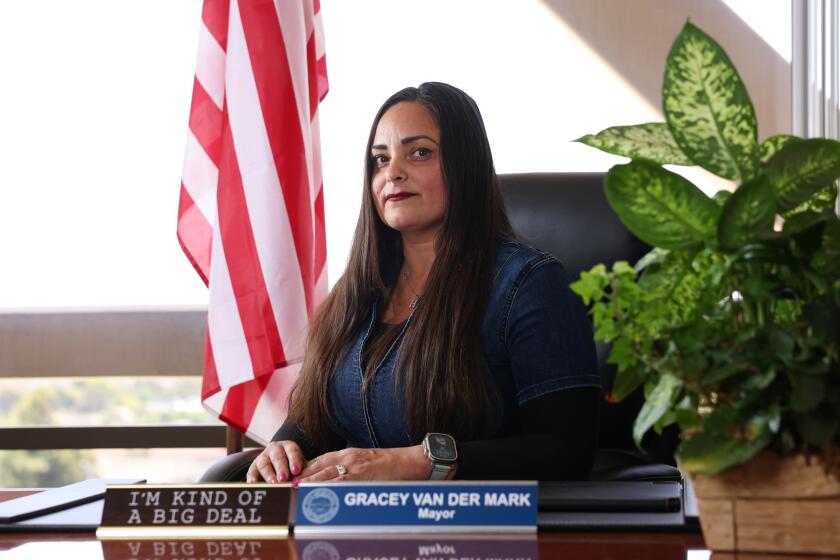Dixon Gayer dies at 92; Orange County’s liberal voice in 1960s
Dixon Gayer thought the politics of 1960s Orange County cried out for a voice of moderation. So he invented one.
Gayer was an admittedly liberal columnist writing in conservative Orange County when the ultraconservative John Birch Society was a political force in the region. He created the Webster Quimmley Society, named for a fictitious hero whose motto was “Sanity and Freedom,” which gained Gayer a measure of national attention for his satirical response to his political opponents.
“We abhor communism and its front organizations and we are violently opposed to the John Birch Society and similar ultraconservative groups,” Gayer told Newsweek magazine in 1961. “We think either extreme threatens the American way of life. Frankly, I don’t see how you can disagree with us unless you’re a Communist or a Bircher.”
Gayer died May 14 at Huntington Beach Hospital after a long battle with colon cancer, said his wife, Lorraine. He was 92.
Gayer introduced the Webster Quimmley Society in 1961 in a column for the Garden Grove News. He wrote that Quimmley shouted “Sanity and freedom!” one day when he stopped his Essex touring car on the Santa Ana Freeway. He could no longer stand the cars recklessly driving by on his left and his right. Quimmley was yearning for the middle of the road.
The story was picked up by the Associated Press and, within a month, “I had almost 10,000 letters from people who wanted to join,” he told The Times in 1987.
There were bumper stickers, badges and membership cards that included an “instant disclaimer and loyalty oath” to be used as a “blanket denial” if members were accused of being a Communist or John Bircher.
Gayer lost his column after the paper changed owners in 1963. He started a political newsletter that he published until 1975, and he continued to hear from people interested in Quimmley.
“Every time I thought Webster was dead, he’d pop up again,” Gayer said. “I was a moderate [ Adlai] Stevenson Democrat. That’s what I was trying to point out through Webster: When extremists of any persuasion get in their ditches and start to throw rocks, they aim at everybody who isn’t in there with them.”
He was born Dixon Lewis Gayer on Jan. 11, 1918, in Flint, Mich. His parents divorced in his youth and he moved with his mother to Long Beach. Gayer graduated from UC Berkeley in 1941.
After college and a brief stint in the Army Signal Corps in 1943, Gayer wrote for Seventeen magazine, the Chicago Sun-Times and the jazz magazine DownBeatbefore going into public relations for RCA Victor and his own firm in New York. He moved his family back to California in the early 1950s to better care for his sons, who had health issues.
Gayer taught at Artesia High School from 1953 to 1956 and at Long Beach Jordan High School in 1957, advising the newspapers at both schools. He also began writing for the Garden Grove News, first on a part-time basis and eventually as a columnist on humor, politics and television. In 1958, he earned a master’s degree from Cal State Long Beach, then called Long Beach State College, and started teaching journalism there in 1959 while continuing to write for the newspaper. He retired from Cal State Long Beach in 1980.
Gayer described in a 1974 Times profile the pressures he received after he started dealing with political topics in his columns, including supporting several liberals in local school district races.
“All of a sudden I started getting late-night phone calls, heavy breathing, people calling me a communist and so on,” he said. “I got so angry, I started writing columns about it. The columns were pretty angry.”
One reader suggested a little satire might be a better approach. “That was the inspiration for starting the Webster Quimmley Society,” he said.
Gayer published his political newsletter, the Dixon Line, until 1975.
John Schmitz, a flamboyant conservative Orange County legislator and a former national director of the John Birch Society who died in 2001, conceded in a 1974 Times story that Gayer was “no great ideological friend.” But he credited Gayer with “good sources of information” and said he was a journalist who “didn’t see Birchers under every bed.”
Along with his wife of 41 years, Gayer is survived by his son, Dixon Gayer II, and a grandson. Another son, Kerry, died in 1991. A previous marriage ended in divorce.
More to Read
Get the Latinx Files newsletter
Stories that capture the multitudes within the American Latinx community.
You may occasionally receive promotional content from the Los Angeles Times.






